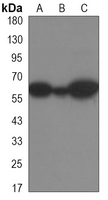Product Name :
YTHDF1 Rabbit monoclonal antibody Background :
N6-methyladenosine (m6A) is an abundant RNA modification that plays an important role in mRNA splicing, processing, and stability. The m6A modification is specifically recognized by members of the YT521B homology (YTH) domain-containing family (YTHDF), consisting of YTHDF1, YTHDF2, and YTHDF3. All three members of the YTHDF family are primarily cytosolic proteins that share similar sequence and domain structure, including a conserved C-terminal YTH domain that specifically interacts with m6A. Despite these similarities, recent studies suggest that YTHDF proteins are involved in distinct regulatory functions with minimal overlap. Specifically, YTHDF1 binding has been reported to promote enhanced mRNA translation, but has no measurable effect on mRNA stability. Conversely, YTHDF2 binding appears to promote mRNA degradation, but has minimal effect on translation efficiency. The function of YTHDF3 is less clear, but it has been proposed to function as an auxiliary protein for both YTHDF1 and YTHDF2, helping to promote either increased mRNA translation or decay, respectively. Additional studies offer a different viewpoint, suggesting that all three YTHDF proteins initiate mRNA degradation, or mediate increased mRNA stability and protein expression, promoting the idea that these proteins may carry out similar rather than distinct functions. Product :
Liquid in 50mM Tris-Glycine (pH 7.4), 0.15M NaCl, 50% Glycerol, 0.01% Sodium azide and 0.05% BSA. Storage&Stability :
Store at 4°C short term. Aliquot and store at -20°C long term. Avoid freeze-thaw cycles. Specificity :
Recognizes endogenous levels of YTHDF1 protein. Immunogen :
Recombinant protein of mouse YTHDF1 Conjugate :
Unconjugated Modification :
Unmodification
YTHDF1 Rabbit monoclonal antibody Background :
N6-methyladenosine (m6A) is an abundant RNA modification that plays an important role in mRNA splicing, processing, and stability. The m6A modification is specifically recognized by members of the YT521B homology (YTH) domain-containing family (YTHDF), consisting of YTHDF1, YTHDF2, and YTHDF3. All three members of the YTHDF family are primarily cytosolic proteins that share similar sequence and domain structure, including a conserved C-terminal YTH domain that specifically interacts with m6A. Despite these similarities, recent studies suggest that YTHDF proteins are involved in distinct regulatory functions with minimal overlap. Specifically, YTHDF1 binding has been reported to promote enhanced mRNA translation, but has no measurable effect on mRNA stability. Conversely, YTHDF2 binding appears to promote mRNA degradation, but has minimal effect on translation efficiency. The function of YTHDF3 is less clear, but it has been proposed to function as an auxiliary protein for both YTHDF1 and YTHDF2, helping to promote either increased mRNA translation or decay, respectively. Additional studies offer a different viewpoint, suggesting that all three YTHDF proteins initiate mRNA degradation, or mediate increased mRNA stability and protein expression, promoting the idea that these proteins may carry out similar rather than distinct functions. Product :
Liquid in 50mM Tris-Glycine (pH 7.4), 0.15M NaCl, 50% Glycerol, 0.01% Sodium azide and 0.05% BSA. Storage&Stability :
Store at 4°C short term. Aliquot and store at -20°C long term. Avoid freeze-thaw cycles. Specificity :
Recognizes endogenous levels of YTHDF1 protein. Immunogen :
Recombinant protein of mouse YTHDF1 Conjugate :
Unconjugated Modification :
Unmodification
-
 Western blot analysis of YTHDF1 expression in Hela (A), CHOK1 (B), Ramos (C) whole cell lysates.
Western blot analysis of YTHDF1 expression in Hela (A), CHOK1 (B), Ramos (C) whole cell lysates.
Bioworld Biotech only provide peptides for our antibodies and do not provide additional peptide customization services.
Price/Size :
USD 368/1mg/vial
Tips:
For phospho antibody, we provide phospho peptide(0.5mg) and non-phospho peptide(0.5mg).Describe :
Blocking peptides are peptides that bind specifically to the target antibody and block antibody binding. These peptide usually contains the epitope recognized by the antibody. Antibodies bound to the blocking peptide no longer bind to the epitope on the target protein. This mechanism is useful when non-specific binding is an issue, for example, in Western blotting (WB) and Immunohistochemistry (IHC). By comparing the staining from the blocked antibody versus the antibody alone, one can see which staining is specific; Specific binding will be absent from the western blot or IHC performed with the neutralized antibody.Formula:
Synthetic peptide was lyophilized with 100% acetonitrile and is supplied as a powder. Reconstitute with 0.1 ml DI water for a final concentration of 10 mg/ml.The purity is >90%,tested by HPLC and MS.
Storage:
The freeze-dried powder is more stable. For short time at 2-8°C. For long term storage store at -20°C.
Note :
This product is for research use only (RUO only). Not for use in diagnostic or therapeutic procedures.
 YTHDF1 Rabbit monoclonal antibody
YTHDF1 Rabbit monoclonal antibody  Datasheet
Datasheet COA
COA MSDS
MSDS SHIP
SHIP